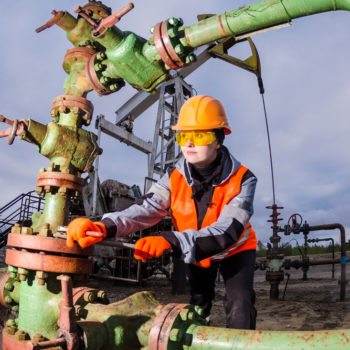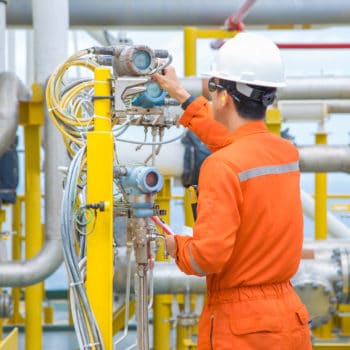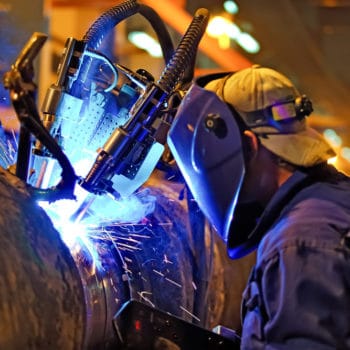Why We Love It
-
$50,660Potential Avg. Salary
-
-5.7%Job Growth Rate
-
InvestigativeCareer Attribute
-
Skill-Based WorkCareer Attribute
Using hydraulic and motor-driven machinery, mining machine operators drill holes and excavate rocks, metals, and other materials such as stones, coal, metal and non-metal ores and rocks. These operators might use continuous mining machines or other heavy equipment in surface or underground mines to execute this task in a timely manner.
Recommended Schools
What is a Mining Machine Operator?
A Mining Machine Operator mainly performs the following duties on a regular basis:
- Operate mining equipment to start and regulate the movement of conveyors and position drill cutters or torches
- Determine the ideal locations where a hole or channel needs to be made with the mining machines
- Provide guidance to skilled construction and extraction personnel with reference to laying track, resetting supports and blocking
- Repair, inspect and maintain extraction and excavation equipment with utmost care, changing cutting teeth with wrenches if required
- Clean equipment parts by spraying them with or soaking them in solvent
Day in the life
A mining machine operator’s day starts at the mining site as part of a crew. These operators may Operate self-propelled mining machines in surface or underground mines. Mining machine operators also assist in the clearing and moving of the extracted material from the mine, by loading it onto conveyors and into shuttle cares at a fast pace.
The operator’s daily job also includes inspecting equipment or structures to track down errors and systemic problems. Whichever piece of equipment the mining machine operator utilizes, he or she will be collaborating with other employees to move waste rock, coal or ore from the mine face at the site.
Work schedule and typical hours
Mining machine operators have to work at least 40 hours per week and/or weekends when required.
Growth of the job
According to the U.S. Bureau of Labour Statistics, the number of jobs for loading machine operators who work in underground mining is expected to increase 6% from 2014 to 2024. Vacancies available for this job role have increased by 62.03 percent nationwide in that time, with an average growth of 10.34 percent per year. Many openings are expected to occur from replacing those who retire or otherwise permanently leave the occupation.
While fluctuating prices for metals, oil and gas may have caused a temporary boom in rates of employment, concerns regarding the environmental consequences of long-term mining might have an adverse impact on the creation of new mining sites within the U.S.
Typical employers
A wide range of mining companies look to hire mining machine operators for their business requirements. For instance, Newmont Mining, Hecla mining company, Energy Fuels Resources, etc. Full-time mechanics may receive good benefits such as sick leave, vacation pay, and health insurance.
Irrespective of where you receive your early training, it is mandatory to take the U.S. Mine Safety and Health Administration’s required mine safety course, which covers first aid training and safety procedures, mining laws and a review of mining technology over the years. New surface miners have to attend 24 hours of training, and those working in underground mines attend 40 hours of training.
Recommended Schools
How To Become a Mining Machine Operator
A high school diploma or its equivalent is the minimum requirement for becoming a mining machine operator, and on-the-job training is common. Most miners receive training from experienced workers. This training can take up to 4-6 months till completion. To become a mining machine operator, candidates have to be at least 18 years of age and in good physical condition.
Mining machine operators might also require a commercial driver’s license (CDL), which can be obtained after a knowledge and skills exam. For those looking to advance their careers in mining, a 4-year degree specialising in geology or earth science from a college or university may bring them closer to great opportunities in mining management.
There are also a few professional technical and 2–year schools that are now offering mine technology courses. Depending on your ability and focus, becoming certified as a journeyman mobile heavy equipment mechanic takes about three to five years as an apprentice to earn the required total of 6000 hours of training.
Mining machine operators use heavy and powerful equipment. In order to use such machinery on a daily basis, they must have superior physical strength and stamina, safety consciousness, and be adept with handling mining machines. They must also possess keen observation and listening skills to ensure the stability and working condition of equipment they are using. Mining machine operators may also need to use computers to virtually operate some machinery.
Mining Machine Operator Salary Data
We’ve provided you the following to learn more about this career. The salary and growth data on this page comes from recently published Bureau of Labor Statistics data while the recommendations and editorial content are based on our research.
National Anual Salary
Low Range
$39,400Average
$50,660High Range
$73,880National Hourly Wage
Low Range
$19/hrAverage
$24/hrHigh Range
$36/hrHow do Mining Machine Operator salaries stack up to other jobs across the country? Based on the latest jobs data nationwide, Mining Machine Operator's can make an average annual salary of $50,660, or $24 per hour. This makes it an Above Average Salary. On the lower end, they can make $39,400 or $19 per hour, perhaps when just starting out or based on the state you live in.
Salary Rankings And Facts
#383 Nationally for All Careers
Programs and Degrees
Here are the most common degrees for becoming a Mining Machine Operator. a is usually recommended and specifically a degree or coursework that prepares you for the particular field, see below.
Highest Education Among Mining Machine Operators
- 0% Doctorate
- 0.6% Masters
- 5.5% Bachelors
- 4.3% Associates
- 23.1% College
- 51.8% High School
- 14.6% Less than High School
Job Growth Projections and Forecast
2014 Total Jobs
12,3002024 Est. Jobs
11,600Job Growth Rate
-5.7%Est. New Jobs
-700How does Mining Machine Operator job growth stack up to other jobs across the country? By 2024, there will be a change of -700 jobs for a total of 11,600 people employed in the career nationwide. This is a -5.7% change in growth over the next ten years, giving the career a growth rate nationwide of Below Average.
Growth Rankings And Facts
#710 Nationally for All Careers
What Companies Employ The Most Mining Machine Operators
| Industry | Current Jobs | New Jobs Needed | % Increase |
|---|---|---|---|
| Coal mining | 4,400 | -600 | -1% |
| Nonmetallic mineral mining and quarrying | 3,400 | --- | --- |
| Metal ore mining | 2,900 | -100 | --- |











